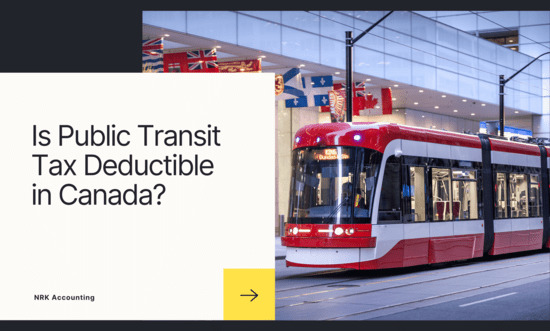Is Public Transit Tax Deductible in Canada? Let’s Find Out
Ever wondered if swiping your transit card could save you money at tax time? In the bustling streets of Canada, where public transit is a lifeline for many, the question of whether these expenses can lighten your tax load is more relevant than ever. Let’s dive into the nitty-gritty of making public transit work for your wallet.
In this article, we’ll cover:
- The basics of public transit tax deductions in Canada
- Eligibility criteria for claiming these deductions
- How to claim your deductions effectively
If navigating the maze of tax deductions feels overwhelming, NRK Accounting is here to guide you. With a team of seasoned tax professionals in Toronto, we’re all about turning complex tax questions into simple, actionable answers.
The Basics of Public Transit Tax Deductions in Canada
Navigating the tax season can often feel like a daunting task, especially when you’re trying to figure out what deductions you’re eligible for. For many Canadians, public transit is not just a convenience; it’s a necessity. Understanding how you can leverage your transit expenses to benefit your tax return is crucial.
Currently, a 15% non-refundable tax credit is available to an individual in respect of the cost of eligible transit passes. This includes annual and monthly passes, as well as weekly passes, and electronic fare cards used on an ongoing basis. It’s a significant boon for regular commuters, making public transit an even more attractive option.
In Canada, the ability to deduct public transit expenses has seen various changes over the years. While specific credits like the Public Transit Tax Credit have been phased out, there are still opportunities under certain conditions, especially for those in specific employment situations or with disabilities.
Eligibility Criteria for Claiming Public Transit Deductions
When it comes to tax deductions in Canada, the devil is in the details. Not all transit expenses are created equal, and knowing what qualifies (and what doesn’t) can make a significant difference in your tax return.
First off, it’s essential to understand that direct public transit deductions from personal income taxes are no longer as straightforward as they once were. However, there are specific scenarios where transit expenses can play a role in reducing your taxable income:
- Employment Expenses: If you’re required to travel as part of your job and your employer does not reimburse you, these expenses might be deductible. This includes travel between different work locations but not your commute from home to work.
- Medical Expenses: For individuals with mobility challenges, expenses related to certain types of transportation to receive medical treatment might be claimable.
- Moving Expenses: If you’ve moved more than 40 kilometers closer to a new job or school, your moving expenses, including transportation, can be deductible.
- Business Use: Self-employed individuals can deduct travel expenses related to their business, including public transit costs, when calculating business income.
Each of these scenarios requires specific documentation and adherence to CRA guidelines. Keeping detailed records and understanding the nuances of these deductions can ensure you’re not leaving money on the table.
How to Claim Your Deductions Effectively
Claiming deductions on your tax return can feel like walking through a maze. But with the right strategy, you can navigate it successfully. Here’s how to ensure you’re effectively claiming your public transit deductions and maximizing your tax return in Canada.
- Gather Your Documentation: The first step is to compile all relevant receipts and records. For public transit, this could include monthly passes, electronic payment records, and any other proof of payment. If you’re claiming travel for employment, medical, or business reasons, ensure you have detailed logs and any necessary certifications or letters.
- Understand the Rules: Each type of deduction has its own set of rules. For example, employment-related travel expenses require a signed T2200 form from your employer. Familiarize yourself with the requirements for each deduction you plan to claim to ensure compliance and maximize your potential refund.
- Use the Right Forms: When filing your tax return, make sure you’re using the correct forms for each type of deduction. The CRA website provides a wealth of resources and guides to help you identify which forms are relevant to your situation.
- Consider Professional Help: Tax laws can be complex and ever-changing. If you’re unsure about your eligibility for certain deductions or how to claim them, consulting with a tax professional can be a wise investment. Firms like NRK Accounting offer expert guidance tailored to your unique situation, ensuring you claim every deduction you’re entitled to.
By following these steps, you can navigate the complexities of tax deductions with confidence. Remember, the goal is not just to reduce your taxable income but to ensure you’re fully compliant with Canadian tax laws, avoiding any potential issues down the line. With careful preparation and possibly professional assistance, you can make the most of your tax return this year.
Want to Navigate Your Taxes with Ease? NRK Account is Here to Help
You’ve just armed yourself with crucial knowledge on public transit tax deductions in Canada. It’s a lot to take in, but you’re now better equipped to navigate the complexities of tax season.
Here are the key takeaways:
- Understand the basics and eligibility criteria for public transit deductions.
- Keep meticulous records and familiarize yourself with the rules.
- Stay informed about potential changes and consider professional help for maximizing deductions.
Navigating the tax landscape doesn’t have to be a solo journey. NRK Accounting is your ally, offering expert guidance to ensure you’re leveraging every opportunity to save and maximize your returns. With our deep understanding of Canadian tax laws and a keen eye on future changes, we make tax planning and filing straightforward and stress-free. Let’s make this tax season your smoothest yet.

